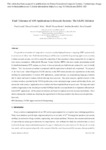Mostrar o rexistro simple do ítem
Fault tolerance of MPI applications in exascale systems: The ULFM solution
| dc.contributor.author | Losada, Nuria | |
| dc.contributor.author | González, Patricia | |
| dc.contributor.author | Martín, María J. | |
| dc.contributor.author | Bosilca, George | |
| dc.contributor.author | Bouteiller, Aurelien | |
| dc.contributor.author | Teranishi, Keita | |
| dc.date.accessioned | 2021-03-24T15:14:25Z | |
| dc.date.issued | 2020-05 | |
| dc.identifier.citation | Nuria Losada, Patricia González, María J. Martín, George Bosilca, Aurélien Bouteiller, Keita Teranishi, Fault tolerance of MPI applications in exascale systems: The ULFM solution, Future Generation Computer Systems, Volume 106, 2020, Pages 467-481, ISSN 0167-739X, https://doi.org/10.1016/j.future.2020.01.026. | es_ES |
| dc.identifier.issn | 0167-739X | |
| dc.identifier.issn | 1872-7115 | |
| dc.identifier.uri | http://hdl.handle.net/2183/27586 | |
| dc.description.abstract | [Abstract] The growth in the number of computational resources used by high-performance computing (HPC) systems leads to an increase in failure rates. Fault-tolerant techniques will become essential for long-running applications executing in future exascale systems, not only to ensure the completion of their execution in these systems but also to improve their energy consumption. Although the Message Passing Interface (MPI) is the most popular programming model for distributed-memory HPC systems, as of now, it does not provide any fault-tolerant construct for users to handle failures. Thus, the recovery procedure is postponed until the application is aborted and re-spawned. The proposal of the User Level Failure Mitigation (ULFM) interface in the MPI forum provides new opportunities in this field, enabling the implementation of resilient MPI applications, system runtimes, and programming language constructs able to detect and react to failures without aborting their execution. This paper presents a global overview of the resilience interfaces provided by the ULFM specification, covers archetypal usage patterns and building blocks, and surveys the wide variety of application-driven solutions that have exploited them in recent years. The large and varied number of approaches in the literature proves that ULFM provides the necessary flexibility to implement efficient fault-tolerant MPI applications. All the proposed solutions are based on application-driven recovery mechanisms, which allows reducing the overhead and obtaining the required level of efficiency needed in the future exascale platforms. | es_ES |
| dc.description.sponsorship | Ministerio de Economía y Competitividad and FEDER; TIN2016-75845-P | es_ES |
| dc.description.sponsorship | Xunta de Galicia; ED431C 2017/04 | es_ES |
| dc.description.sponsorship | National Science Foundation of the United States; NSF-SI2 #1664142 | es_ES |
| dc.description.sponsorship | Exascale Computing Project; 17-SC-20-SC | es_ES |
| dc.description.sponsorship | Honeywell International, Inc.; DE-NA0003525 | es_ES |
| dc.language.iso | eng | es_ES |
| dc.publisher | Elsevier BV * North-Holland | es_ES |
| dc.relation.uri | https://doi.org/10.1016/j.future.2020.01.026 | es_ES |
| dc.rights | Atribución-NoComercial-SinDerivadas 3.0 España | es_ES |
| dc.rights.uri | http://creativecommons.org/licenses/by-nc-nd/3.0/es/ | * |
| dc.subject | MPI | es_ES |
| dc.subject | Resilience | es_ES |
| dc.subject | ULFM | es_ES |
| dc.subject | Application-level checkpointing | es_ES |
| dc.title | Fault tolerance of MPI applications in exascale systems: The ULFM solution | es_ES |
| dc.type | info:eu-repo/semantics/article | es_ES |
| dc.rights.access | info:eu-repo/semantics/embargoedAccess | es_ES |
| dc.date.embargoEndDate | 2021-06-01 | es_ES |
| dc.date.embargoLift | 2021-06-01 | |
| UDC.journalTitle | Future Generation Computer Systems | es_ES |
| UDC.volume | 106 | es_ES |
| UDC.startPage | 467 | es_ES |
| UDC.endPage | 481 | es_ES |
| dc.identifier.doi | 10.1016/j.future.2020.01.026 |
Ficheiros no ítem
Este ítem aparece na(s) seguinte(s) colección(s)
-
GI-GAC - Artigos [193]






